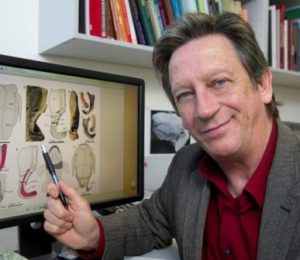
The Verco Medal – the highest honour bestowed by the Royal Society of South Australia – has been awarded to Flinders University’s internationally-esteemed palaeontologist, Professor John Long.
To be announced tonight (Thursday, October 9) at an award’s ceremony, the prestigious Verco Medal is awarded annually for distinguished scientific work published by a Society fellow, and aims to recognise their significant, exceptional contributions science.
Joining an elite group of revered and respected scientists including Antarctic explorer Sir Douglas Mawson, Professor Long was commended for his research work in the field of palaeontology.
His major feats include uncovering the origins of internal fertilisation, copulation and viviparity in vertebrates; finding the world’s oldest known vertebrate embryos; discovering dinosaurs and giant marine reptiles in Western Australia, and leading three expeditions to recover preserved megafauna from the Nullarbor Caves.
Professor Long’s discoveries led to the establishment of Australia’s first official state fossil emblem in WA in 1995. In addition, his fossil collecting expeditions throughout Australia, Antarctica, South Africa, China, Thailand, Vietnam, Iran, the US and Europe have resulted in the discovery of more than 70 new fossil species.
Nominated by Flinders Professor Mike Bull, Associate Dean (Research) in the School of Biological Sciences, Professor Long described the award as an honour and a surprise.
“It is indeed an honour to receive this award in view of the eminent list of previous award winners,” Professor Long said.
“It sends a strong message out to the community that palaeontology is still thriving in Australia, and that our team at Flinders University is now one of Australia’s leading research groups for this exciting discipline,” he said.
Professor Long said he has been “very lucky” throughout his career to have made such significant fossil finds, both from field work and searching existing museum collections.
“The beauty of palaeontology in Australia is that we have a vast and ancient landmass, with huge unexplored areas just bursting with potential to yield internationally significant fossil finds,” he said.
“Without searching we simply don’t find anything new, so it’s imperative not just for palaeontology but for all natural sciences that we must all keep exploring.”
In a major coup for Flinders, Professor Long was appointed Strategic Professor of Palaeontology in February 2013, following three years as Vice President of Research and Collections at the Natural History Museum of Los Angeles County.
A distinguished and internationally-renowned Australian palaeontologist, Professor Long made world headlines in 2008 when he and his team discovered the oldest-known example of a mother giving birth to live young from the remains of an ancient fossil fish.
Rewriting much of the history of evolution, Professor Long has published more than 220 scientific papers and popular articles, including seven recent papers in the journals Nature and Science, and even appears in the 2010 Guinness Book of Records.
He also holds the title of being Flinders University’s most popular writer for The Conversation, based on his impressive following of more than 140,000 readers. He also writes a monthly column “The Fossil Files” for Australasian Science magazine.
The Royal Society of South Australia’s Verco Medal was first awarded to UK-born geologist Professor Walter Howchin in 1929. Since then recipients have included Sir Douglas Mawson, an Australian geologist, Antarctic explorer and academic, and Professor Herbert George Andrewartha, a distinguished Australian scientist in the fields of entomology, biology, zoology and animal ecology.

